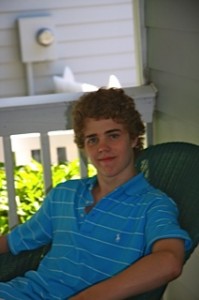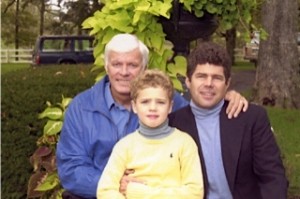 For three generations, John Y. Browns have been active Democratic politicians in Kentucky.
For three generations, John Y. Browns have been active Democratic politicians in Kentucky.
John Y. Brown Sr., my great-grandfather, was an avid supporter of FDR’s New Deal while serving a term in the US House of Representatives and was a champion of various liberal causes in Kentucky’s state House for several decades.
John Y. Brown Jr., my grandfather, served one term as a Democratic governor of the Commonwealth and was the national chairman for the Democratic Telethons of the early 1970s.
My father, John Y. Brown III, was a two term Democratic Secretary of State and delegate to the Democratic National Convention in 1996.
Being the fourth John Y. Brown, most people would expect that I would follow the tradition and become a Democrat. However, when I turn 18 later this month, I plan on registering with the Republican Party. It has been a decision that I have thought out fully and feel good about—even if it appears to break with a family political tradition.
 As my political philosophy developed over the years, it became clearer and clearer that I was drifting rightward. My father would tell me that he believed the temperament we’re born with influences our political philosophy—as much as our ideas and beliefs. My personal political journey has confirmed this in many ways. Every time I heard about an issue where there was major disagreement between the political parties, I found myself siding with the Republicans over the Democrats. Eventually, I stopped resisting this and embraced my inclination toward a conservative political philosophy.
As my political philosophy developed over the years, it became clearer and clearer that I was drifting rightward. My father would tell me that he believed the temperament we’re born with influences our political philosophy—as much as our ideas and beliefs. My personal political journey has confirmed this in many ways. Every time I heard about an issue where there was major disagreement between the political parties, I found myself siding with the Republicans over the Democrats. Eventually, I stopped resisting this and embraced my inclination toward a conservative political philosophy.
I am told that I first showed a tendency towards conservatism when I was 6-years-old in the midst of the hotly contested 2000 presidential race. My father asked me who I was for in the race, and I answered that I was for George W. Bush because he wore cowboy boots and, unlike Al Gore, did not want to take away people’s guns (which I assumed included toy guns, like the ones I owned that my mom would sometimes threaten to take away). This could be seen as an early hint that I was more conservative by nature. It wasn’t a straight path from my conversation with my dad at age 6 to registering as a Republican this month—but it was close.
Up to the watershed election of 2008, I almost never thought about political matters. I was more concerned with video games, friends, and all of the other things middle school aged boys are typically interested in. That changed on a dime. Sometime during the 2008 presidential election, I became fascinated with the ins and outs of politics. I also began to find out what my personal political philosophy was and what I believed. As this happened, I began to realize that I found myself agreeing far more often with Republicans like John McCain than I did with Democrats like Barack Obama or Hillary Clinton.
The moment that I realized that I was truly a conservative was while I was in a car with my parents driving home from a summer camp in Alabama. Just like 2000, my father asked me who I planned on being for in that year’s presidential election. He brought up Barack Obama. Not knowing much about the election, I asked what sort of things he was advocating. My father brought up universal health care. The idea sounded appealing at first, but then reality set in. universal health care meant government running health care. Even at the young age of 14, I knew I was against that. We continued discussing other issues like taxes, immigration, foreign policy, and gun control. Time and time again, I was far more conservative than I was liberal. After that car ride, there was no going back. I was a conservative for life.
After the 2008 election was over, I didn’t abandon my conservative philosophy. As President Obama moved our country in an aggressively liberal direction, I became more and more conservative. I saw the role of the federal government already being large enough before 2008. I certainly didn’t see a need for it to get even larger.
This was my basic personal journey towards becoming a conservative. Surprisingly, the person who has had the most influence on my political beliefs is my Democratic father, who has helped foster my political and rhetorical development in a way that most fathers foster their son’s physical development. In our case, my father has a lot more to teach about politics and rhetoric than about sports.
Some fathers and sons wrestle when the son becomes mature enough physically to challenge the father. In our household, where nobody is taller than 5’9 and Super Bowl Sunday is seen as an opportunity to avoid crowds at restaurants and movie theatres, my father and I debate politics instead. He gets home from work late in the evening, and I will typically make a casual conversation while I prepare for battle. Before he answers any of the meaningless questions I ask to lure him in, I start in with an offhand political comment to provoke him. “So dad, did you hear about the unemployment figures announced today and Obama’s disappointing response?” And, we’d go at it. At first it was like when we’d play basketball when I was younger….my father would seem to play hard but I somehow would always win. But after a while our late night debates were like our more recent basketball games. I could tell my dad was playing as hard as he could and wouldn’t always win. And sometimes I’d even let him win a game (or in this case, an argument) because I felt bad for him. All in all, this process emboldened me and my decision to become a republican.
Deep down, I think my father enjoys having a Republican to argue with in the family as much I enjoy having him to argue with, but he would never admit it. Of course, I am very lucky to have a father who is not only willing to accept me and my beliefs but is also willing to support my pursuits. Believe it or not, my father, a lifelong Democrat, encouraged me more than anyone else to continue exploring my developing conservatism. He bought me conservative books and magazines that I wanted to read, introduced me to other Republicans, and, most importantly, gave me every detail of what it was like to be alive while Ronald Reagan was president—in as balanced a way as he could coming from a Democrat. He even introduced me to the writings and interviews of the famous conservative thinker William F. Buckley, who he also happens to admire.
Some political families are not particularly accepting of dissent. However, I really don’t see my conservatism as dissent. When I asked my father a few years ago if it would be okay if I broke the family tradition and became a Republican, he responded “Of course. The John Y. Brown legacy isn’t about being a Republican or Democrat. It is about being independent and standing up for what you think is best way to advance our state . It’s about being true to yourself. And I’d be disappointed if you weren’t true to yourself.”
So, in my view, the real rejection of the John Y. Brown legacy would be to abandon my own principles. When I register to vote next week, I may seem on the surface to be breaking a family political tradition. But I know deep down I will only be carrying on a more important tradition of being my own person and being true to my own beliefs.









Leave a Reply